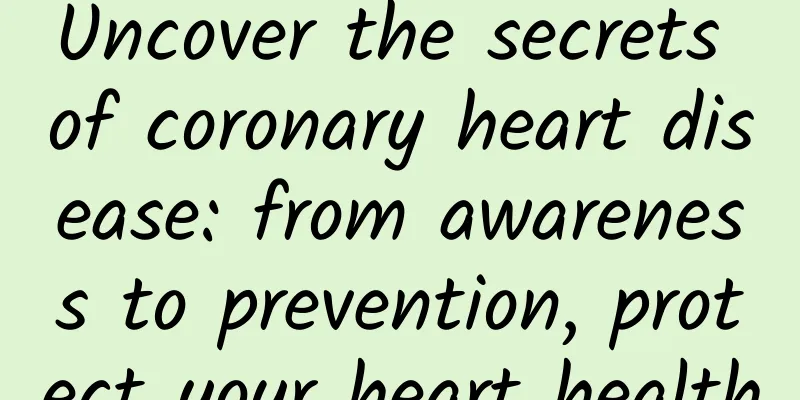Uncover the secrets of coronary heart disease: from awareness to prevention, protect your heart health

|
Author: Zhang Lixin, Chief Nurse, Beijing Anzhen Hospital, Capital Medical University Reviewer: Chen Qiling, Chief Physician, Peking University People's Hospital Coronary heart disease, as the "number one killer" among cardiovascular diseases, has quietly cast its shadow over many families. Especially as people age, it is like a latent crisis, silently affecting the health of the middle-aged and elderly population. If we compare the heart to a busy city, the coronary arteries are the lifeline that keeps the city running. Once these "arterial highways" have problems, the city of the heart will fall into an energy crisis, and chest pain, chest tightness and other uncomfortable symptoms will follow. In severe cases, it may even lead to myocardial infarction or sudden cardiac death. So, in the face of coronary heart disease, what can we do? Figure 1 Original copyright image, no permission to reprint First of all, a deep understanding of coronary heart disease is the first step. Coronary heart disease, the full name is coronary atherosclerotic heart disease, is prone to the following factors: Gender and age: The risk of coronary heart disease in men is generally higher than that in women, but the risk of coronary heart disease in women increases significantly after menopause. In addition, the risk of coronary heart disease increases gradually with age, especially for people over 40 years old. The prevalence of coronary heart disease doubles with every 10 years of age. Genetic factors: Genetic factors play an important role in the development of coronary heart disease. If there is a history of early-onset coronary heart disease in the family (before the age of 55 for men and before the age of 65 for women), the risk of coronary heart disease in their offspring will increase, so prevention should be strengthened. Personality and lifestyle: Personality traits such as impatience, irritability, and over-ambition, as well as a lifestyle lacking physical activity, may increase the risk of coronary heart disease. People who sit still for a long time and lack exercise have slower blood circulation, which makes them more likely to develop coronary heart disease. Three highs and metabolic problems: High blood pressure, high blood lipids, and high blood sugar are the three major risk factors for coronary heart disease, known as the "three highs." These metabolic problems are often interrelated, forming metabolic syndrome, which further increases the risk of coronary heart disease. When patients with coronary heart disease experience sudden chest pain, it is crucial to take the correct emergency measures. Here are some key recommendations: Call the emergency number 120 immediately: If you find that a patient has sudden chest pain, you should call the emergency number 120 immediately and inform the patient's basic condition and symptoms. Keep the patient quiet and comfortable: While waiting for the arrival of emergency personnel, ensure that the patient lies or sits quietly, keeps the environment quiet, unbuttons the collar, and ensures indoor air circulation. Blood pressure measurement and medication: If conditions permit, the patient's blood pressure can be measured. If nitroglycerin is available and the patient's blood pressure is not low (systolic pressure is not less than 90 mmHg), the patient can be given sublingual nitroglycerin. After 3-5 minutes of observation, if the symptoms are not relieved, the patient can consider giving the drug again under the guidance of a doctor. If the patient's blood pressure is too low, nitroglycerin should not be used; if loss of consciousness occurs, cardiopulmonary resuscitation should be started immediately. Figure 2 Original copyright image, no permission to reprint Avoid driving to the hospital by yourself: In the event of sudden chest pain, patients should avoid driving to the hospital by themselves to avoid accidents on the way. Prevention of coronary heart disease is a systematic project from the source to the entire treatment process. Primary prevention emphasizes changes in lifestyle, advocating smoking cessation, alcohol restriction, regular exercise, maintaining an optimistic attitude, and controlling the "three highs". Secondary prevention is for confirmed patients, requiring strict compliance with doctor's orders, controlling the condition through medication such as low-dose aspirin or statins, and regular check-ups to avoid worsening of the condition. Tertiary prevention is for those with severe conditions, striving to improve the quality of life and prolong life through intensive treatment and life management. Family members learning cardiopulmonary resuscitation skills will increase the safety of patients, because in an emergency, every second of correct handling may save a life. |
>>: Athlete's foot keeps coming back, can it be cured?
Recommend
What to do if you have diarrhea during menstruation
Menstruation is of great significance to female f...
Yellow leucorrhea in early pregnancy
Women's secretions can generally reflect whet...
How long after the infusion can I have a baby?
Nowadays, infertility is becoming more and more s...
What supplements should I take for uterine fibroids
Uterine fibroids are a kind of female gynecologic...
Weekly weight gain for pregnant women
After a woman becomes pregnant, many aspects of h...
Postventricular hemorrhage
Some women experience vaginal bleeding after havi...
Symptoms of low estrogen in girls
Estrogen is a very important hormone for women. O...
How to treat after biochemical abortion
Women during pregnancy should take good care of t...
There is only a little blood after the abortion
For some women who want to terminate their pregna...
The United States uses the most advanced microscope to see viruses in the air?
Recently, a picture of "the air is full of v...
Causes of sequelae after abortion
Many people who do not want children choose abort...
What to do if you have pubic pain after childbirth
We all know that if women do not adjust their bod...
[Medical Q&A] What are the causes of female infertility?
Author: Li He, deputy chief physician, Shanghai J...
What is the white paste that comes out of a woman's nipple?
The breasts of women are the most important part ...









